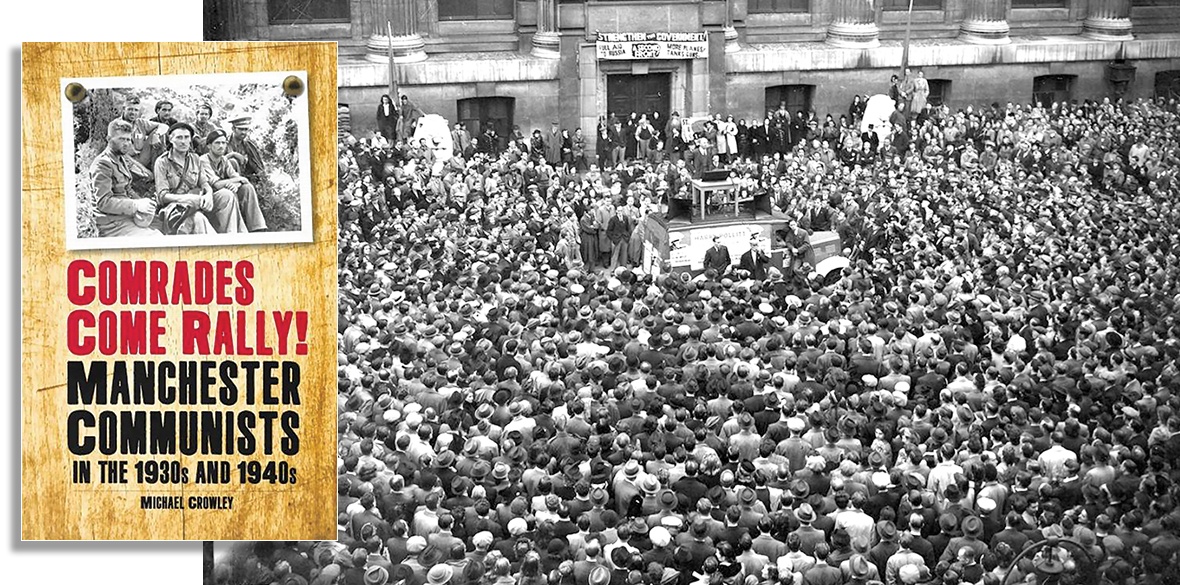This is the last article you can read this month
You can read more article this month
You can read more articles this month
Sorry your limit is up for this month
Reset on:
Please help support the Morning Star by subscribing here
Comrades Come Rally! Manchester Communists in the 1930s and 1940s
by Michael Crowley
Bookmarks £15
IF Manchester was the birthplace of capitalism, as is so often argued, then so too was it not only an important site for the emergence of, among other things, Chartism and women’s suffrage but also for its ultimate nemesis, namely scientific communism.
An exaggeration? Of course. But like many an exaggeration, it contains an element of truth — and what better way of exploring this relationship than by looking at Michael Crowley’s recently published text, documenting the history of the Communist Party in this revolutionary city during the conflict-ridden years of the 1930s and 1940s?
In 1934 the British Union of Fascists had 40,000 members and 5,000 of those were in Lancashire.
The egomaniac Oswald Mosley made Manchester a priority and began to organise an intensive campaign of intimidation and terror, largely directed at the city’s sizeable Jewish population.
Many tried to ignore this, but Crowley quickly makes clear that the Communist Party was absolutely central to combating fascists from the start.
The Cheetham-based branch of the Young Communist League rapidly became the biggest branch outside of London’s East End.
Its broad-based organisation centred around the paper Challenge had a allegiance of around 500 in Cheetham alone who were often attracted not only by its dances, film shows and paper sales, but by well-attended boxing classes in an area which, by the admission of the head of the city’s police force, often saw four to five “incidents” on a weekly basis.
Around 130 party members from Manchester volunteered for the International Brigades in Spain and 38 were killed and many more wounded.
Commander of the British Battalion Sam Wild, daredevil motorcyclist Clem Beckett and YCL member and later tank regiment combatant Benny Goldman have all become fairly widely known, but less so are communist turned Labour MP and minister of education Ellen Wilkinson, and nurse Madge Addy, who later worked for the Special Operations Executive and was sent to Nazi-occupied France.
What really makes this book special, though, is that Crowley uses excerpts from the diaries of lesser-known Ralph Cantor and Maurine Levine, as well as notes from previously unpublished interviews he carried out with veterans in the ’70s and ’80s.
Industrially, the party in Manchester had an influence which seems incredible today.
Individual factory branches at Metro Vickers and Fairey aviation numbered in their hundreds, so much so that the latter under the leadership of Mick Jenkins arguably became the most successful factory branch ever and had to rent out Levenshulme town hall for its meetings.
Despite the ban on the Daily Worker, industry-wide news sheets such as the engineers New Propellor were incredibly widely read.
Crowley puts paid to criticisms that the party abandoned class politics by emphasising the importance of all-out production during the war years. The party continued to successfully defend pay and conditions during wartime.
And the repercussions of all this for active party members? Crowley points out that full-timers were on a paltry wage, if one at all.
All activists ran the added risk of fines and imprisonment. Eddie Frow was sent to jail for leading a protest against the means test, as were five Manchester comrades for leading the Kinder trespass in 1932.
Following the outbreak of WWII, some welcomed the party’s stridently anti-war message, while others regarded it as a betrayal of anti-fascism.
Manchester-born and popular party leader Harry Pollitt was replaced by the cold ideologue Rajani Palme Dutt.
Crowley argues that although support for policy from members was often lukewarm and sometimes generated public hostility, on balance negative fallout was minimal at least compared to reactions to later events in Hungary in 1956 and Czechoslovakia in 1968.
Culturally, the role of Jimmie Miller, later Ewan MacColl, is dutifully celebrated, but other than a fascinating note about a party- organised historical pageant in Gorton and an intriguing reference to Bury-born surrealist and communist poet, Roger Roughton, there doesn’t appear to be anything specifically unique to what Manchester produced and achieved during the period covered.
In any text of this kind there’s bound to be political differences. Pointing out the so-called similarities between communist politics and religious belief grates a little bit and would surprise many adherents to either school of thought.
More seriously, the author doesn’t appear to think that anything of worth was created during the Soviet Union and that many of the Manchester activists he otherwise treats with respect, admiration and affection were in effect dupes of a totally brutal and anti-working-class system
In concluding comments, Crowley reiterates the fact that shelving the ultra-leftist class-against-class politics for a popular frontist anti-fascist position paid dividends, as did the eventual formation of an allied front against the fascist powers in which the popularity of the Soviet Union among the British people could only bring dividends for the political party most closely linked to it.
In 1931 CP membership stood at 2,711 — by 1938 this had risen to 18,000 and by 1945 to around 60,000. Crowley makes the interesting point that the party had achieved its highest membership, largest newspaper sales, widest trade union influence and greatest cultural impact in a period of low levels of class warfare and zero attempts at electoral change.
Ultimately, if you want to see how a Communist Party put politics into action during world historic times then this book is definitely not one to be missed.









